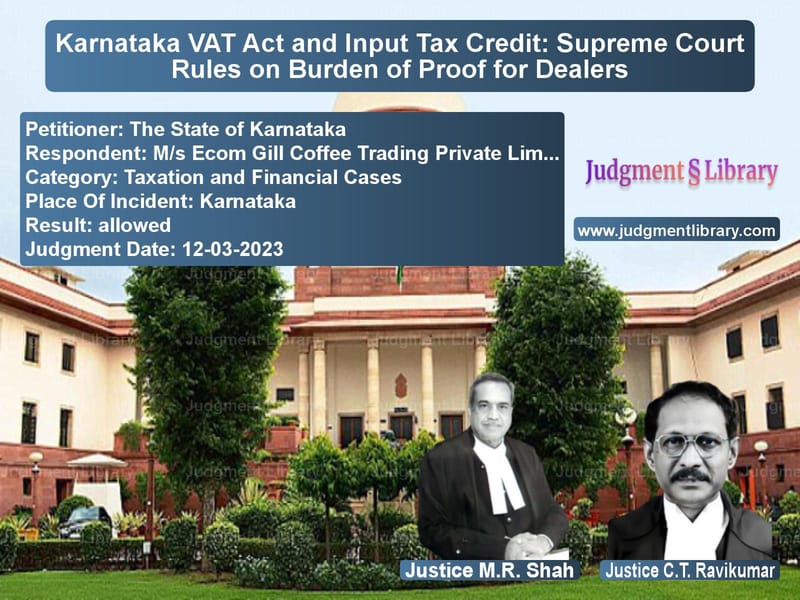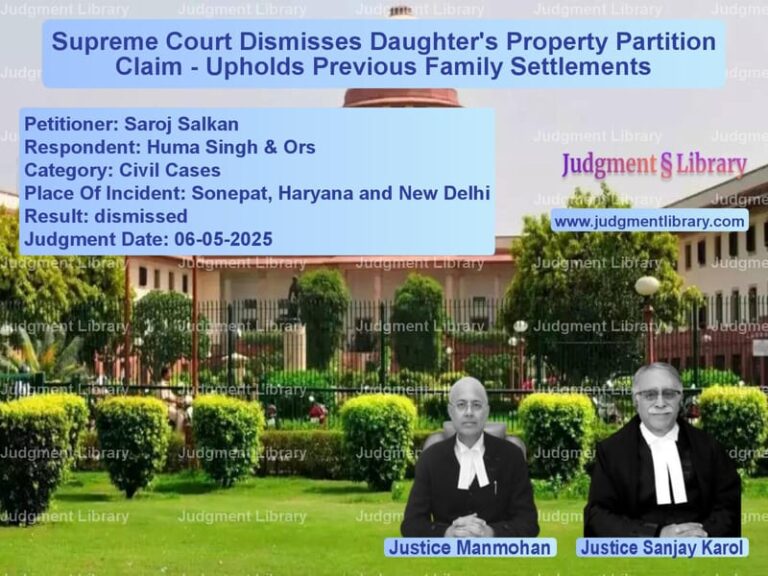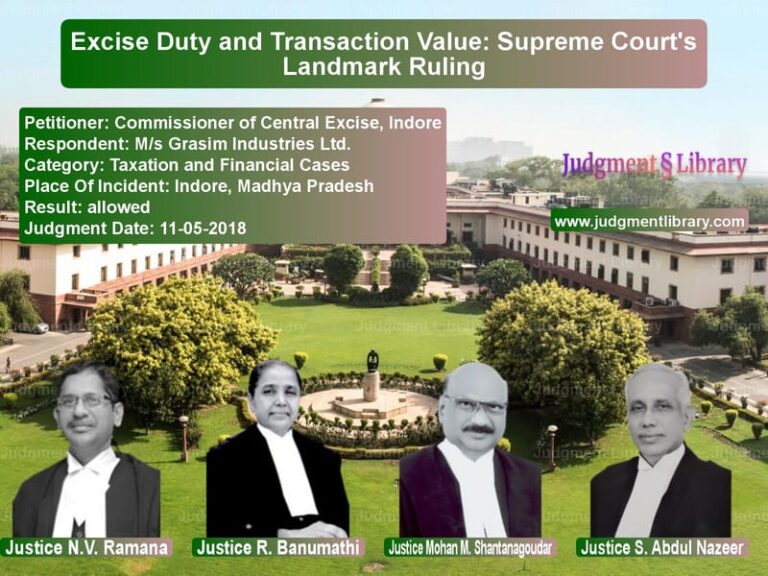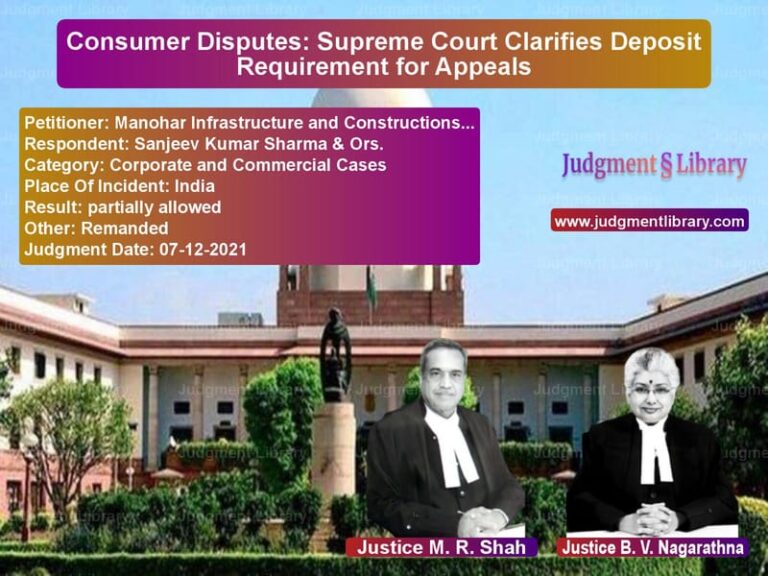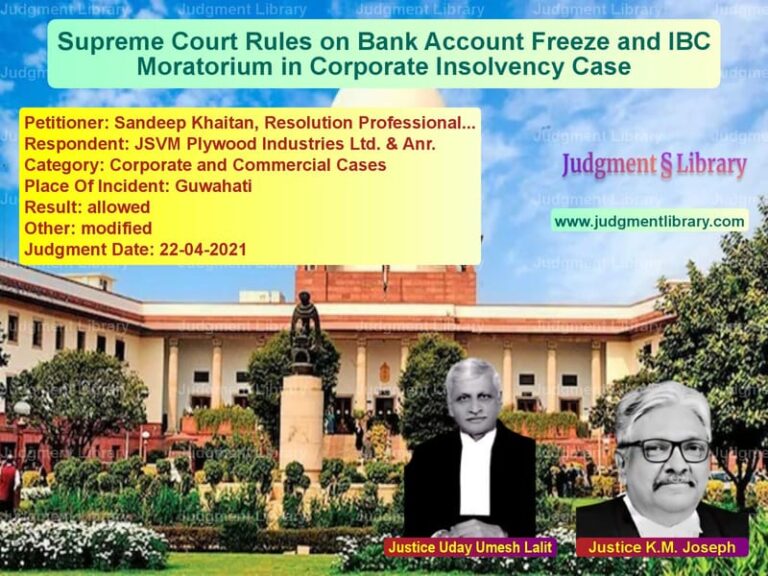Karnataka VAT Act and Input Tax Credit: Supreme Court Rules on Burden of Proof for Dealers
The Supreme Court of India has recently delivered a significant ruling in the case of The State of Karnataka v. M/s Ecom Gill Coffee Trading Private Limited and other related appeals, concerning the interpretation of Section 70 of the Karnataka Value Added Tax Act, 2003 (KVAT Act, 2003). This judgment is crucial for businesses and tax authorities alike as it clarifies the burden of proof required for claiming Input Tax Credit (ITC) under the KVAT Act.
The case revolved around whether purchasing dealers who had bought goods from registered sellers but later found out that the sellers had either failed to file tax returns or had their registrations canceled, were still entitled to ITC. The Supreme Court ruled in favor of the state, emphasizing that the burden of proving the legitimacy of transactions lies solely on the purchasing dealer. This decision overturned the Karnataka High Court’s ruling, which had favored the purchasing dealers.
Background of the Case
The dispute arose when various purchasing dealers in Karnataka claimed ITC on transactions with registered sellers. However, the tax authorities disallowed these claims, arguing that the selling dealers:
- Had their registrations canceled.
- Had filed NIL returns, indicating no transactions took place.
- Did not deposit the tax collected from the purchasing dealers.
The tax authorities contended that since the tax was never paid by the sellers, the purchasing dealers could not claim ITC on such transactions. The purchasing dealers, on the other hand, argued that they had made payments through legitimate means and should not be penalized for the defaults of the sellers.
Petitioner’s Arguments (State of Karnataka)
The State of Karnataka, represented by Additional Advocate General Nikhil Goel, made the following key arguments:
- The High Court erred in allowing ITC claims merely on the basis that transactions were made through bank transfers and invoices were provided.
- As per Section 70 of the KVAT Act, 2003, the burden of proof to show that the transaction is genuine lies on the purchasing dealer.
- ITC can only be granted if the dealer can prove actual physical movement of goods, which was not established in the present case.
- The Karnataka High Court’s decision went against previous rulings, where courts held that ITC claims require verification of actual transactions and not just documentation.
Respondent’s Arguments (Purchasing Dealers)
The purchasing dealers countered these claims with the following points:
- They had made payments to registered dealers through legitimate banking channels.
- They had complied with the KVAT Act by maintaining proper tax invoices.
- They should not be penalized for the non-compliance of the selling dealers.
- The denial of ITC would lead to financial hardship for businesses that had acted in good faith.
Supreme Court’s Judgment
The Supreme Court bench, comprising M.R. Shah and C.T. Ravikumar, overturned the Karnataka High Court’s ruling and held that ITC cannot be claimed unless the purchasing dealer proves the actual movement of goods and payment of tax. The Court ruled:
“The burden of proving the correctness of the ITC claim is squarely upon the assessee who has to discharge the said burden. Merely because the dealer claims that he is a bona fide purchaser is not enough and sufficient.”
Further, the Court emphasized that documentation alone is not sufficient and directed that:
- Purchasing dealers must provide additional evidence such as transport documents, proof of delivery, and freight payments.
- Authorities have the right to deny ITC if the seller has defaulted in paying taxes.
- The KVAT Act clearly places the burden on the purchasing dealer, and courts cannot dilute this requirement.
Implications of the Judgment
The ruling has several key implications for businesses operating under the VAT system:
- Purchasing dealers must exercise due diligence before transacting with suppliers to ensure that they are compliant with tax laws.
- ITC claims must be substantiated with physical proof of goods movement and not just invoices.
- Businesses that fail to verify their suppliers’ tax compliance may risk losing their ITC claims.
- Tax authorities have more power to scrutinize and deny ITC claims if discrepancies are found.
Conclusion
The Supreme Court’s judgment in this case strengthens the enforcement of the KVAT Act by ensuring that ITC claims are backed by real transactions and not just paperwork. The decision places a greater responsibility on businesses to verify the credibility of their suppliers before making purchases. This ruling is expected to influence similar cases across India, reinforcing the principle that tax compliance is a shared responsibility between buyers and sellers.
Petitioner Name: The State of Karnataka.Respondent Name: M/s Ecom Gill Coffee Trading Private Limited.Judgment By: Justice M.R. Shah, Justice C.T. Ravikumar.Place Of Incident: Karnataka.Judgment Date: 12-03-2023.
Don’t miss out on the full details! Download the complete judgment in PDF format below and gain valuable insights instantly!
Download Judgment: the-state-of-karnata-vs-ms-ecom-gill-coffee-supreme-court-of-india-judgment-dated-12-03-2023.pdf
Directly Download Judgment: Directly download this Judgment
See all petitions in Income Tax Disputes
See all petitions in GST Law
See all petitions in Tax Evasion Cases
See all petitions in Banking Regulations
See all petitions in Tax Refund Disputes
See all petitions in Judgment by Mukeshkumar Rasikbhai Shah
See all petitions in Judgment by C.T. Ravikumar
See all petitions in allowed
See all petitions in supreme court of India judgments March 2023
See all petitions in 2023 judgments
See all posts in Taxation and Financial Cases Category
See all allowed petitions in Taxation and Financial Cases Category
See all Dismissed petitions in Taxation and Financial Cases Category
See all partially allowed petitions in Taxation and Financial Cases Category

